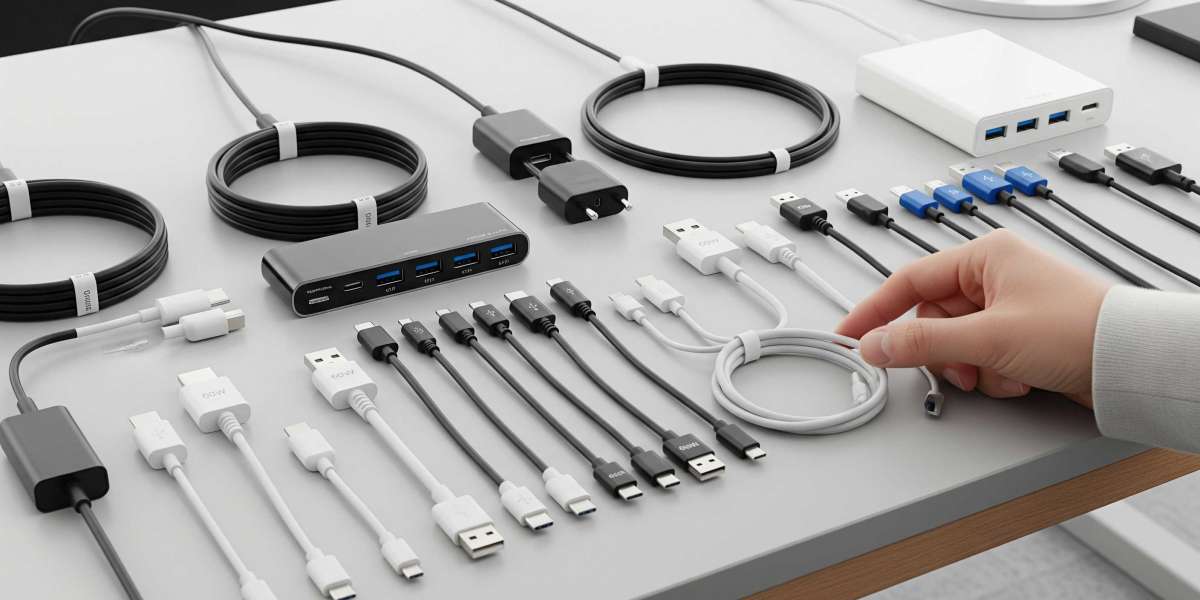Have you ever grabbed any USB cable and wondered, “Will this one work for my device?” It’s a good question! Not all USB cables are made the same, and using the wrong one can affect how your device charges or transfers data. Let’s explain in simple terms why it really does matter what USB cable you choose.
What Is a USB Cable?
A USB cable is a special wire that connects your phone, tablet, computer, or other gadgets to chargers or other devices. It carries power to charge your device and can also send data like music, photos, or videos. USB cables come in different shapes, sizes, and quality levels.
The Exact Answer: Does It Matter What USB Cable I Use?
Yes, it matters a lot what USB cable you use!
The right USB cable ensures your device charges quickly, transfers data without errors, lasts a long time, and keeps your device safe. Using a cheap or wrong cable can slow charging, cause data problems, or even damage your device.
Types of USB Cables: Shapes and Speeds
Before picking a cable, it’s helpful to know about the common types.
USB Type-A: The big flat plug you find on many chargers and computers.
USB Type-C: A small, oval, reversible plug used by most new phones and laptops.
Micro-USB and Mini-USB: Older, smaller connectors used by older devices.
Cables differ not only by shape but also by technology:
USB 2.0: Older and slower, good for basic charging and small data transfers.
USB 3.0 and above: Much faster data movement and better charging power.
Choosing a cable with the right shape and version for your device is key.
Why Using the Right USB Cable Affects Charging
The cable carries electricity to your device. If the cable isn’t made well or is the wrong type, it might only send a little power, making charging take longer.
Good-quality cables have thicker wires and proper materials that carry power safely and efficiently. Cheap cables may get hot, break quickly, or cause your device to charge slowly.
If your device supports fast charging, using a cable that can handle higher power (like those labeled “fast charge” or supporting Power Delivery) makes your battery fill up faster.
How Cable Quality Affects Data Transfer
If you use your USB cable to send photos, videos, or music between devices, quality matters here too.
Low-quality cables can cause interruptions or errors, making transfers slow or causing files to get corrupted. Good cables have better shielding and thicker wires that protect your data signals and keep the transfer smooth.
This is especially important if you move large files often or want to back up your data quickly.
Durability and Safety Matter Too
Cheap USB cables often break in a short time. Connectors might get loose, and wires inside may fray or expose, risking damage.
Good cables have strong connectors, braided or thick jackets, and reinforced parts that last longer even with daily use or travel.
Using a poor cable can sometimes cause devices or chargers to overheat, which may harm your gadgets.
Can Using the Wrong USB Cable Damage Your Device?
While rare, some low-quality or incompatible cables can damage devices by supplying incorrect power levels or creating short circuits.
Using certified, well-made cables helps protect your device’s battery and electronics from problems.
How to Know if Your USB Cable Is Right
Check if the cable matches your device’s port shape (USB-C, USB-A, Micro-USB).
Look for cables that support your device’s charging needs, especially fast charging.
Buy cables from trusted brands or sellers offering quality guarantees.
Look at the packaging for certifications like USB-IF or Power Delivery support.
Feel for sturdy, thick cables rather than very thin or flimsy ones.
USB Cables: Length and Speed Considerations
Shorter cables usually charge faster and keep data signals clearer. Longer cables can work but might slow things down if they’re cheap quality.
If you want quick charging or fast file transfers, pick a cable that supports the latest USB versions and isn't too long.
Why Buy a Good USB Cable Even If It Costs More?
Good cables last longer, charge faster, and avoid frustrating connection issues. Spending a little more upfront saves you time, effort, and money later.
Cheap cables might seem like a bargain but can cause slow charging, bad data transfer, or even harm your device.
Where to Find a Quality USB Cable for Sale
When searching for a USB cable for sale, be sure to check product details. Look for customer reviews, trusted brands, and cables that meet your device’s specs.
Buying online gives you many choices, but be careful with very cheap cables with no reviews or unknown sellers.
Fun Facts About USB Cables
USB cables started in the 1990s to standardize charging and data transfer.
The blue color inside a USB 3.0 cable’s plug helps you spot it easily.
USB Type-C cables can charge laptops, transfer huge files, and even send video signals all through one cable.
Summary
So yes, it definitely matters what USB cable you use. The right cable gives you:
Faster, safer charging
Smooth, error-free data transfers
Longer-lasting cables that won’t break easily
Protection for your valuable devices
Next time you buy a USB cable for sale, remember to pick one that fits your device, is made of good quality, supports the speeds and power you need, and comes from a trusted brand.
Your devices will work better, last longer, and you’ll save frustration. Happy charging and connecting!








